Lori Hatcher's Blog: Refresh Blog, page 65
November 17, 2016
How Bump Drafting Can Help You Grow Spiritually
God reveals truth in the strangest places. Take NASCAR, for example.

This week I learned about a racing technique called drafting. Drafting occurs when a car follows behind the lead car so closely that it drives in the wind current created by that car. This allows the second car to run at the same speed, but use less fuel.
In essence, the lead car sucks the second car along in its wind wake. Sometimes a driver will get close enough to bump the lead car, causing both to accelerate. They call this bump drafting.
As I thought about this sometimes-controversial racing practice, I realized that drafting is a great technique for Christians—off the roadways, of course.
As a young Christian, I was fortunate to attend church with many women who were older and more mature in the faith. Several took me under their wings and modeled how to rear their children, respect their husbands, and serve the Lord and his people. As I watched them, I learned from their examples. In essence, I was drafting them—following along in their wake and gaining speed from their spiritual energy.
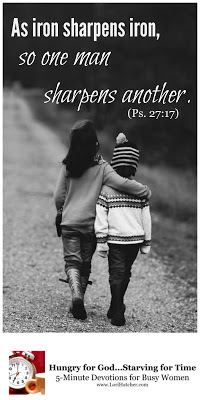 Now, as a mature believer, I continue to benefit from running my spiritual race in close proximity to other Christians. When I run closely to my friend Maryann, her commitment to pray for and witness to her unsaved loved ones fuels my determination to be a faithful witness. When I run closely to my friend Mandy, her commitment to accomplish every task with excellence fuels my desire to be the best at everything I do. When I run closely to my friend Jean, her commitment to develop her gifts and talents and use them for God’s glory fuels my determination to continue to sharpen and polish my own.
Now, as a mature believer, I continue to benefit from running my spiritual race in close proximity to other Christians. When I run closely to my friend Maryann, her commitment to pray for and witness to her unsaved loved ones fuels my determination to be a faithful witness. When I run closely to my friend Mandy, her commitment to accomplish every task with excellence fuels my desire to be the best at everything I do. When I run closely to my friend Jean, her commitment to develop her gifts and talents and use them for God’s glory fuels my determination to continue to sharpen and polish my own.
My friends’ energy and examples suck me along and remind me of the benefits of doing life with other Christians. This is why God ordained the church and encourages us not to “give up meeting together, as some are in the habit of doing, but let us encourage one another—and all the more as you see the Day approaching” (Heb. 10:25).
As we watch others live out their faith, we're inspired and challenged to take our own faith walks more seriously. As Psalm 27:17 says, “As iron sharpens iron, so one man sharpens another.”
So next time you’re channel surfing and catch a glimpse of a NASCAR race, think about those who are running the faith race ahead of you. Pull up close behind them, share their passion, and follow their example. But don’t forget to look in your rear view mirror at the younger Christians following in your wind current. They need you to set the pace and share the energy and direction God has given you.
When the checkered flag waves, may we all be able to say, “I have fought the good fight, I have finished the race, I have kept the faith” (2 Tim. 4:7).
Now it’s your turn. Who have been your mentors and examples? Leave a comment below and share your thoughts. And if you’re reading by email, CLICK HERE to visit Hungry for God online, scroll to the bottom of the post, and leave a comment there.
If you enjoyed this post, why not subscribe? I'll send you twice-weekly 5-minute devotions to help nourish your soul.
Because women need to connect with God in the craziness of life.
Enter your email address and VALIDATE the Feedburner email sent to your inbox.
Delivered by FeedBurner
If this post was meaningful to you, would you consider sharing it with a friend by clicking on one of the buttons below? Did you know you can receive bi-weekly Hungry for God posts sent directly to your email inbox? Visit http://www.lori-benotweary.blogspot.com and click on the link in the right hand corner to Subscribe Via Email.
Copyright 2012 by Lori Hatcher

This week I learned about a racing technique called drafting. Drafting occurs when a car follows behind the lead car so closely that it drives in the wind current created by that car. This allows the second car to run at the same speed, but use less fuel.
In essence, the lead car sucks the second car along in its wind wake. Sometimes a driver will get close enough to bump the lead car, causing both to accelerate. They call this bump drafting.
As I thought about this sometimes-controversial racing practice, I realized that drafting is a great technique for Christians—off the roadways, of course.
As a young Christian, I was fortunate to attend church with many women who were older and more mature in the faith. Several took me under their wings and modeled how to rear their children, respect their husbands, and serve the Lord and his people. As I watched them, I learned from their examples. In essence, I was drafting them—following along in their wake and gaining speed from their spiritual energy.
 Now, as a mature believer, I continue to benefit from running my spiritual race in close proximity to other Christians. When I run closely to my friend Maryann, her commitment to pray for and witness to her unsaved loved ones fuels my determination to be a faithful witness. When I run closely to my friend Mandy, her commitment to accomplish every task with excellence fuels my desire to be the best at everything I do. When I run closely to my friend Jean, her commitment to develop her gifts and talents and use them for God’s glory fuels my determination to continue to sharpen and polish my own.
Now, as a mature believer, I continue to benefit from running my spiritual race in close proximity to other Christians. When I run closely to my friend Maryann, her commitment to pray for and witness to her unsaved loved ones fuels my determination to be a faithful witness. When I run closely to my friend Mandy, her commitment to accomplish every task with excellence fuels my desire to be the best at everything I do. When I run closely to my friend Jean, her commitment to develop her gifts and talents and use them for God’s glory fuels my determination to continue to sharpen and polish my own. My friends’ energy and examples suck me along and remind me of the benefits of doing life with other Christians. This is why God ordained the church and encourages us not to “give up meeting together, as some are in the habit of doing, but let us encourage one another—and all the more as you see the Day approaching” (Heb. 10:25).
As we watch others live out their faith, we're inspired and challenged to take our own faith walks more seriously. As Psalm 27:17 says, “As iron sharpens iron, so one man sharpens another.”
So next time you’re channel surfing and catch a glimpse of a NASCAR race, think about those who are running the faith race ahead of you. Pull up close behind them, share their passion, and follow their example. But don’t forget to look in your rear view mirror at the younger Christians following in your wind current. They need you to set the pace and share the energy and direction God has given you.
When the checkered flag waves, may we all be able to say, “I have fought the good fight, I have finished the race, I have kept the faith” (2 Tim. 4:7).
Now it’s your turn. Who have been your mentors and examples? Leave a comment below and share your thoughts. And if you’re reading by email, CLICK HERE to visit Hungry for God online, scroll to the bottom of the post, and leave a comment there.
If you enjoyed this post, why not subscribe? I'll send you twice-weekly 5-minute devotions to help nourish your soul.
Because women need to connect with God in the craziness of life.
Enter your email address and VALIDATE the Feedburner email sent to your inbox.
Delivered by FeedBurner
If this post was meaningful to you, would you consider sharing it with a friend by clicking on one of the buttons below? Did you know you can receive bi-weekly Hungry for God posts sent directly to your email inbox? Visit http://www.lori-benotweary.blogspot.com and click on the link in the right hand corner to Subscribe Via Email.
Copyright 2012 by Lori Hatcher
Published on November 17, 2016 08:45
November 13, 2016
10 Things I've Learned from Children
I used to be afraid of small children.
So much so that I feared I’d be a terrible mother. Now, two children and two grandchildren later, I find tiny human beings incredibly fascinating.
Here are ten things I’ve discovered about them:
1. They have no fear of dirt or bugs, but run from washcloths and tissues.
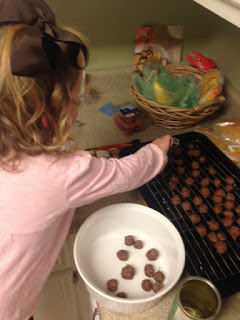 Helping Gigi make meatballs.2. They wrinkle their noses in disgust at the dinner you’ve prepared, but will eagerly eat acorns, paper, and stale Cheerios they find lodged in the sofa.
Helping Gigi make meatballs.2. They wrinkle their noses in disgust at the dinner you’ve prepared, but will eagerly eat acorns, paper, and stale Cheerios they find lodged in the sofa.
3. They’re amazingly observant and will point out, loudly enough for the world to hear, the spider veins on your ankles and the “prickles” on your legs.
4. They love repetition. They’ll eagerly listen to six choruses of “The Ants Go Marching,” and beg you to read Chicka Chicka Boom Boom and Going on a Bear Hunt every chance they get.
5. They love routine and predictability. They take great security in knowing that the second shelf in the pantry always holds boxes of raisins, cups of applesauce, and packages of peanut butter crackers. They’ll choose “the pink plate that looks like a flower” every time. And if you mess up by giving Sissy the pink sippy cup instead of the blue one, prepare to be corrected.
6. They’ll surprise you in the sweetest, most spontaneous ways.
“Giiiiiiigiiiiiiiii,” I heard three-year-old Lauren call a few minutes after we’d tucked her into bed. “Lemme show you somefing.” She held up five fingers, then carefully folded down the middle two—the International Sign Language symbol for “I love you.”
7. They have a quirky sense of humor. Our neighbors have just adopted a dog, so we walked over to meet him.
“His name is Oliver,” I told Lauren.
“Like olive,” she said. “His nose looks like an olive.”
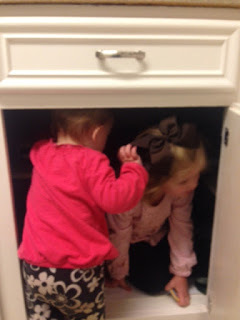 8. They’re always up for fun. From a jump in a leaf pile, to a pillow fight, to silly bathroom jokes, no one will ever accuse children of being too serious. They love to laugh, and their giggles are the sweetest sound on the planet. Carefree and spontaneous, they hang in the air like chimes in the wind.
8. They’re always up for fun. From a jump in a leaf pile, to a pillow fight, to silly bathroom jokes, no one will ever accuse children of being too serious. They love to laugh, and their giggles are the sweetest sound on the planet. Carefree and spontaneous, they hang in the air like chimes in the wind.
9. They’re fascinated by everything. Pulling baby oak trees and finding acorns beneath the soil. Filling a watering can from a spigot in the rain barrel. Watching a squirrel hop from branch to branch in the oak tree overhead. The world is their classroom, and they are eager, engaged learners.
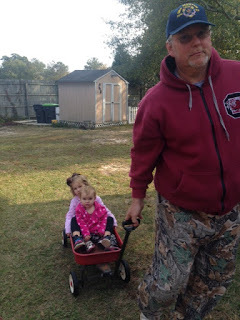 10. They remind us that life is an adventure, and the best way to experience it is with those you love.
10. They remind us that life is an adventure, and the best way to experience it is with those you love.
I’m not surprised that Jesus enjoyed children. Naturally inquisitive, trusting, and transparent, they embody the characteristics of a good disciple.
"Let the little children come to me,” he said, “and do not hinder them, for the kingdom of God belongs to such as these. I tell you the truth, anyone who will not receive the kingdom of God like a little child will never enter it” (Luke 18:16-17).
Now it’s your turn. What characteristics of children do you especially enjoy? In what way do you wish you were more like them? Leave a comment below and join the conversation. If you’re reading by email, CLICK HERE to visit Hungry for God online, scroll to the bottom of the post, and leave a comment.
If you enjoyed this post, why not subscribe? I'll send you twice-weekly 5-minute devotions to help nourish your soul.
Because women need to connect with God in the craziness of life.
Enter your email address and VALIDATE the Feedburner email sent to your inbox.
Delivered by FeedBurner
If this post was meaningful to you, would you consider sharing it with a friend by clicking on one of the buttons below? Did you know you can receive bi-weekly Hungry for God posts sent directly to your email inbox? Visit http://www.lori-benotweary.blogspot.com and click on the link in the right hand corner to Subscribe Via Email.
Copyright 2012 by Lori Hatcher
So much so that I feared I’d be a terrible mother. Now, two children and two grandchildren later, I find tiny human beings incredibly fascinating.
Here are ten things I’ve discovered about them:
1. They have no fear of dirt or bugs, but run from washcloths and tissues.
 Helping Gigi make meatballs.2. They wrinkle their noses in disgust at the dinner you’ve prepared, but will eagerly eat acorns, paper, and stale Cheerios they find lodged in the sofa.
Helping Gigi make meatballs.2. They wrinkle their noses in disgust at the dinner you’ve prepared, but will eagerly eat acorns, paper, and stale Cheerios they find lodged in the sofa. 3. They’re amazingly observant and will point out, loudly enough for the world to hear, the spider veins on your ankles and the “prickles” on your legs.
4. They love repetition. They’ll eagerly listen to six choruses of “The Ants Go Marching,” and beg you to read Chicka Chicka Boom Boom and Going on a Bear Hunt every chance they get.
5. They love routine and predictability. They take great security in knowing that the second shelf in the pantry always holds boxes of raisins, cups of applesauce, and packages of peanut butter crackers. They’ll choose “the pink plate that looks like a flower” every time. And if you mess up by giving Sissy the pink sippy cup instead of the blue one, prepare to be corrected.
6. They’ll surprise you in the sweetest, most spontaneous ways.
“Giiiiiiigiiiiiiiii,” I heard three-year-old Lauren call a few minutes after we’d tucked her into bed. “Lemme show you somefing.” She held up five fingers, then carefully folded down the middle two—the International Sign Language symbol for “I love you.”
7. They have a quirky sense of humor. Our neighbors have just adopted a dog, so we walked over to meet him.
“His name is Oliver,” I told Lauren.
“Like olive,” she said. “His nose looks like an olive.”
 8. They’re always up for fun. From a jump in a leaf pile, to a pillow fight, to silly bathroom jokes, no one will ever accuse children of being too serious. They love to laugh, and their giggles are the sweetest sound on the planet. Carefree and spontaneous, they hang in the air like chimes in the wind.
8. They’re always up for fun. From a jump in a leaf pile, to a pillow fight, to silly bathroom jokes, no one will ever accuse children of being too serious. They love to laugh, and their giggles are the sweetest sound on the planet. Carefree and spontaneous, they hang in the air like chimes in the wind. 9. They’re fascinated by everything. Pulling baby oak trees and finding acorns beneath the soil. Filling a watering can from a spigot in the rain barrel. Watching a squirrel hop from branch to branch in the oak tree overhead. The world is their classroom, and they are eager, engaged learners.
 10. They remind us that life is an adventure, and the best way to experience it is with those you love.
10. They remind us that life is an adventure, and the best way to experience it is with those you love. I’m not surprised that Jesus enjoyed children. Naturally inquisitive, trusting, and transparent, they embody the characteristics of a good disciple.
"Let the little children come to me,” he said, “and do not hinder them, for the kingdom of God belongs to such as these. I tell you the truth, anyone who will not receive the kingdom of God like a little child will never enter it” (Luke 18:16-17).
Now it’s your turn. What characteristics of children do you especially enjoy? In what way do you wish you were more like them? Leave a comment below and join the conversation. If you’re reading by email, CLICK HERE to visit Hungry for God online, scroll to the bottom of the post, and leave a comment.
If you enjoyed this post, why not subscribe? I'll send you twice-weekly 5-minute devotions to help nourish your soul.
Because women need to connect with God in the craziness of life.
Enter your email address and VALIDATE the Feedburner email sent to your inbox.
Delivered by FeedBurner
If this post was meaningful to you, would you consider sharing it with a friend by clicking on one of the buttons below? Did you know you can receive bi-weekly Hungry for God posts sent directly to your email inbox? Visit http://www.lori-benotweary.blogspot.com and click on the link in the right hand corner to Subscribe Via Email.
Copyright 2012 by Lori Hatcher
Published on November 13, 2016 18:55
November 9, 2016
The Gift of Flexibility
 A friend gave me a very special gift recently—the gift of flexibility. In a world where we’re all doing our own things, furthering our own agendas, and looking out for our own best interests, it was a rare and precious treasure.
A friend gave me a very special gift recently—the gift of flexibility. In a world where we’re all doing our own things, furthering our own agendas, and looking out for our own best interests, it was a rare and precious treasure. Flexibility has several definitions. The first is my favorite: the ability to bend without breaking. Ever seen toddlers go to pieces? They’re not characterized by their ability to bend without breaking. We, however, should be. The second definition is equally profound: the ability to be easily modified. And the final: a willingness to change or compromise.
My friend’s willingness to yield her preference for someone else’s made me appreciate anew this valuable quality. It also sealed my undying love for her.
Flexibility voices itself in many different ways:
It says, “Whatever you’d like to do is fine with me.”
It says, “I don’t care; you pick.”
It says, “It doesn’t matter where we go, just as long as we’re together.”
It says, “I know it’s short notice, but I’d be glad to help.”
I’m not saying we should never express an opinion or a preference. I also realize we can’t be flexible all the time, nor should we yield our convictions or commitments. We can, however, like my dear friend, look for simple ways to honor others above ourselves.
Here are some ideas:
1. If you normally pick the restaurant, television show, or weekend activity, let someone else choose. Who knows? You just might discover a new favorite.
2. If a boss or coworker asks you to pitch in outside your area of expertise, say yes. Employers highly value employees who approach their job with a flexible mindset.
3. If your spouse or friend is running late, don’t fuss and fume. Extend grace. Ask, “How can I help you?”
4. If you’re stuck in a line and people around you are grumbling, say something pleasant to infuse positive energy into the situation. Keep the big picture in mind, realizing that a little delay probably won’t significantly alter the outcome of your day.
Flexibility is a quality Type A people like me especially struggle with. We’re decisive, opinionated, and motivated. We like efficiency and getting things done, and we usually have a clear idea of how to make it happen. Because of these traits, it can be really hard for us to be flexible. But like definition #1 above, if we don’t bend, someday we might break.
Now it’s your turn. How have you given the gift of flexibility? Maybe someone else’s flexibility has blessed your life? Tell us about it in the comment box and join the conversation. If you’re reading by email, click HERE to visit Hungry for God online, scroll down, and share your thoughts in the comment section.
If you enjoyed this post, why not subscribe? I'll send you twice-weekly 5-minute devotions to help nourish your soul.
Because women need to connect with God in the craziness of life.
Enter your email address and VALIDATE the Feedburner email sent to your inbox.
Delivered by FeedBurner
If this post was meaningful to you, would you consider sharing it with a friend by clicking on one of the buttons below? Did you know you can receive bi-weekly Hungry for God posts sent directly to your email inbox? Visit http://www.lori-benotweary.blogspot.com and click on the link in the right hand corner to Subscribe Via Email.
Copyright 2012 by Lori Hatcher
Published on November 09, 2016 18:38
November 6, 2016
How to Stop Being Afraid
I’ve never been to prison, but I’ve seen enough movies to imagine what it’s like.
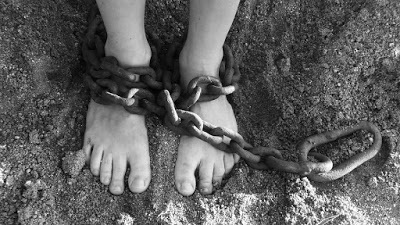 Dark.
Dark.
Lonely.
Scary.
I’ve never had a death sentence either, but I would imagine that knowing I was scheduled to be executed would multiply the darkness, loneliness, and fear a hundredfold.
That’s why reading Paul’s words in 2 Timothy 1:7 puzzled me:
“For God has not given us a spirit of fear, but of power and of love and of a sound mind.”
How could the apostle Paul be fearless when he was sitting in a dark, smelly, nasty Roman prison, chained to guards and awaiting execution? At his trial, all his friends had forsaken him. Even those who had previously stood by him fled for fear of similar persecution. Some had even spread lies about him, hoping to add to his afflictions. Winter was coming, and he lacked appropriate clothing. Death and disease were all around him.
Yet he encouraged Timothy, his beloved son in the faith, “Don’t be afraid. We are not powerless. Love others. Think on those things that are true.”
I’ve heard the phrase, “Dying grace,” and I see it manifested in the latter days of Paul’s life. As he sat and waited for the day of his execution, probably by decapitation, as was the way of the Romans, he was fearless. In a strange way, he was even looking forward to the day.
"For I am hard pressed between the two, having a desire to depart and be with Christ, which is far better,” he wrote in Philippians 1:23.
I don’t know about you, but I’ve felt more than a few twinges of fear lately, and I’m nowhere near a prison cell.
We live in a culture that no longer respects and values Judaeo-Christian ethics. It sees Christians as menaces to society, not assets. Our laws and public policies are becoming increasingly hostile to men and women of faith.
And then there’s the election.
Feel a tremor of fear yet? Have I ruined your first cup of coffee? Cinched that knot in your gut a little tighter? Well, stay with me, because the secret to Paul’s fearless acceptance of his circumstances is also our key to a fearless life:
“For this reason I also suffer these things; nevertheless I am not ashamed, for I know whom I have believed and am persuaded that He is able to keep what I have committed to Him until that Day” (2 Tim. 1:12).
Paul’s eyes weren’t on the cold stone of his jail cell. They weren’t on the death sentence hanging over his soon-to-be-decapitated head. They weren’t even on his own inner strength. Paul’s eyes were on Christ.
“I know whom I have believed. . .” he said.
Paul didn’t find his peace within himself. He found his peace in the person of Jesus Christ.
Jesus, who could not lie. Jesus, who promised to keep his soul from hell.
Jesus, who swore to reward his efforts with gold, silver, and precious stones.
Jesus, who defeated death and proved it could be done.
Jesus, who endured the cross, despised the shame, and sat down at the right hand of the throne of God because his work of redemption was finished.
“I know whom I have believed,” Paul said. “I know he is able to keep my soul from perishing and make everything right in the end.” In this he found hope, strength, and courage. And fearlessness.
Do you want to live a fearless life? Take a lesson from Paul. Know the Christ in whom you believe. Study his life. Read his book. Follow his example. Trust him with everything that is dear to you and never look back.
“. . . Keep your head in all situations, endure hardship, do the work of an evangelist, discharge all the duties of your ministry” (1 Tim. 4:5).
Then, when the day comes, we can say with the mighty apostle,
“I have fought the good fight, I have finished the race, I have kept the faith. Now there is in store for me the crown of righteousness, which the Lord, the righteous Judge, will award to me on that day—and not only to me, but also to all who have longed for his appearing” (1 Tim. 4:6-8).
What promises of Christ help banish fear from your life? Here are a few of my favorites:
“Be strong and courageous. Do not be afraid or terrified because of them, for the LORD your God goes with you; he will never leave you nor forsake you” (Deu. 31:6).
“So do not fear, for I am with you; do not be dismayed, for I am your God. I will strengthen you and help you; I will uphold you with my righteous right hand” (Isa. 41:10).
“God is our refuge and strength, an ever-present help in trouble. Therefore we will not fear” (Psa. 46:1).
Why not commit one of these verses to memory this week? Then whenever fear threatens to overwhelm you, you’ll have a powerful weapon to use to defeat it.
What about you? How do you banish fear from your life? Leave a comment below and share your thoughts. If you’re reading by email, click HERE to visit Hungry for God online, scroll down, and leave a comment at the end of the post.
If you enjoyed this post, why not subscribe? I'll send you twice-weekly 5-minute devotions to help nourish your soul.
Because women need to connect with God in the craziness of life.
Enter your email address and VALIDATE the Feedburner email sent to your inbox.
Delivered by FeedBurner
If this post was meaningful to you, would you consider sharing it with a friend by clicking on one of the buttons below? Did you know you can receive bi-weekly Hungry for God posts sent directly to your email inbox? Visit http://www.lori-benotweary.blogspot.com and click on the link in the right hand corner to Subscribe Via Email.
Copyright 2012 by Lori Hatcher
 Dark.
Dark. Lonely.
Scary.
I’ve never had a death sentence either, but I would imagine that knowing I was scheduled to be executed would multiply the darkness, loneliness, and fear a hundredfold.
That’s why reading Paul’s words in 2 Timothy 1:7 puzzled me:
“For God has not given us a spirit of fear, but of power and of love and of a sound mind.”
How could the apostle Paul be fearless when he was sitting in a dark, smelly, nasty Roman prison, chained to guards and awaiting execution? At his trial, all his friends had forsaken him. Even those who had previously stood by him fled for fear of similar persecution. Some had even spread lies about him, hoping to add to his afflictions. Winter was coming, and he lacked appropriate clothing. Death and disease were all around him.
Yet he encouraged Timothy, his beloved son in the faith, “Don’t be afraid. We are not powerless. Love others. Think on those things that are true.”
I’ve heard the phrase, “Dying grace,” and I see it manifested in the latter days of Paul’s life. As he sat and waited for the day of his execution, probably by decapitation, as was the way of the Romans, he was fearless. In a strange way, he was even looking forward to the day.
"For I am hard pressed between the two, having a desire to depart and be with Christ, which is far better,” he wrote in Philippians 1:23.
I don’t know about you, but I’ve felt more than a few twinges of fear lately, and I’m nowhere near a prison cell.
We live in a culture that no longer respects and values Judaeo-Christian ethics. It sees Christians as menaces to society, not assets. Our laws and public policies are becoming increasingly hostile to men and women of faith.
And then there’s the election.
Feel a tremor of fear yet? Have I ruined your first cup of coffee? Cinched that knot in your gut a little tighter? Well, stay with me, because the secret to Paul’s fearless acceptance of his circumstances is also our key to a fearless life:
“For this reason I also suffer these things; nevertheless I am not ashamed, for I know whom I have believed and am persuaded that He is able to keep what I have committed to Him until that Day” (2 Tim. 1:12).
Paul’s eyes weren’t on the cold stone of his jail cell. They weren’t on the death sentence hanging over his soon-to-be-decapitated head. They weren’t even on his own inner strength. Paul’s eyes were on Christ.
“I know whom I have believed. . .” he said.
Paul didn’t find his peace within himself. He found his peace in the person of Jesus Christ.
Jesus, who could not lie. Jesus, who promised to keep his soul from hell.
Jesus, who swore to reward his efforts with gold, silver, and precious stones.
Jesus, who defeated death and proved it could be done.
Jesus, who endured the cross, despised the shame, and sat down at the right hand of the throne of God because his work of redemption was finished.
“I know whom I have believed,” Paul said. “I know he is able to keep my soul from perishing and make everything right in the end.” In this he found hope, strength, and courage. And fearlessness.
Do you want to live a fearless life? Take a lesson from Paul. Know the Christ in whom you believe. Study his life. Read his book. Follow his example. Trust him with everything that is dear to you and never look back.
“. . . Keep your head in all situations, endure hardship, do the work of an evangelist, discharge all the duties of your ministry” (1 Tim. 4:5).
Then, when the day comes, we can say with the mighty apostle,
“I have fought the good fight, I have finished the race, I have kept the faith. Now there is in store for me the crown of righteousness, which the Lord, the righteous Judge, will award to me on that day—and not only to me, but also to all who have longed for his appearing” (1 Tim. 4:6-8).
What promises of Christ help banish fear from your life? Here are a few of my favorites:
“Be strong and courageous. Do not be afraid or terrified because of them, for the LORD your God goes with you; he will never leave you nor forsake you” (Deu. 31:6).
“So do not fear, for I am with you; do not be dismayed, for I am your God. I will strengthen you and help you; I will uphold you with my righteous right hand” (Isa. 41:10).
“God is our refuge and strength, an ever-present help in trouble. Therefore we will not fear” (Psa. 46:1).
Why not commit one of these verses to memory this week? Then whenever fear threatens to overwhelm you, you’ll have a powerful weapon to use to defeat it.
What about you? How do you banish fear from your life? Leave a comment below and share your thoughts. If you’re reading by email, click HERE to visit Hungry for God online, scroll down, and leave a comment at the end of the post.
If you enjoyed this post, why not subscribe? I'll send you twice-weekly 5-minute devotions to help nourish your soul.
Because women need to connect with God in the craziness of life.
Enter your email address and VALIDATE the Feedburner email sent to your inbox.
Delivered by FeedBurner

If this post was meaningful to you, would you consider sharing it with a friend by clicking on one of the buttons below? Did you know you can receive bi-weekly Hungry for God posts sent directly to your email inbox? Visit http://www.lori-benotweary.blogspot.com and click on the link in the right hand corner to Subscribe Via Email.
Copyright 2012 by Lori Hatcher
Published on November 06, 2016 19:00
November 2, 2016
If Our Bibles Go Away
 Despite the fact that my husband and I have been married for almost 32 years, we did something recently that we’ve never done before.
Despite the fact that my husband and I have been married for almost 32 years, we did something recently that we’ve never done before. David and I walk every morning, and while we walk, we pray*. We cover a lot of literal and spiritual ground as we tromp around our neighborhood. We pray for our children and grandchildren, lost family members, missionaries, friends, neighbors, and even strangers.
Sometimes we spend the whole walk praising and thanking God and don’t ask him for a thing. He already knows what’s on our hearts, and sometimes we need to remind ourselves exactly who God is so we’re less tempted to worry or fret.
But one morning, we completely switched up our time with the Lord. “Why don’t we quote Scripture back to God? I’ll go first.”
Then I quoted the verse that’s been resonating with me ever since I read it in my quiet time early in the week: “I know whom I have believed and am persuaded that he is able to keep that which I’ve committed unto Him against that day.”
I didn’t remember the verse reference (I’m horrible about that.), and I’m not sure I quoted it verbatim, but speaking the words aloud made my heart and my faith braver. Hearing the words made them seem more real, and I found my fist clenching with the conviction that what I’d just declared was really true.
David countered with, “The Lord is the strength of my heart and my portion forever.”
I volleyed back, “Be strong and courageous, for the Lord thy God is with you.”
“I go to prepare a place for you, that where I am, there you will be also.”
“For whosoever calls upon the name of the Lord shall be saved.”
“I saw the Lord, high and lifted up, and the train of his robe filled the temple.”
“‘Remember me when you come into your kingdom.’ ‘Today you will be with me in Paradise.’”
I wondered how long we’d be able to continue our Scripture tennis match, but the longer we walked in the early-morning darkness, the more verses and passages God brought to our minds. I was surprised.
During my daughters’ homeschooling years we memorized longer portions of the Bible, but other than that, I’ve seldom intentionally memorized Scripture. But I have read God’s Word daily for the last ten years or so. God promises his Word never returns void, and the recall we had despite our 50-year-old brains was evidence of this.
 As we were quoting Scripture to each other, I remembered a story that happened during the Cultural Revolution in China. The government was becoming increasingly hostile to people of faith. Persecution against Christians came to a head when the government began confiscating and burning Bibles and other Christian literature.
As we were quoting Scripture to each other, I remembered a story that happened during the Cultural Revolution in China. The government was becoming increasingly hostile to people of faith. Persecution against Christians came to a head when the government began confiscating and burning Bibles and other Christian literature. In her book, Reading Christian Scriptures in China , author Chloe Starr writes, “In spite of the mass confiscation and burning of Christian Scripture, people managed to hide away individual copies, subsequently read in secret and divided into portions for wider circulation. Many learned large portions, or large parts of the Bible by heart, not least by memorization . . . in this way texts from the Bible . . . were transmitted orally, especially passages considered central to the Christian faith and ethos.”
But preservation through memorization isn’t limited to Christians. Jews also committed large portions of Scripture to memory. Joe Amaral, in his book, What Would Jesus Read , writes,
“After the destruction of the first temple in Jerusalem, the Jews were exiled to Babylon. Not only was there no longer a physical place to go pray, even the sacred Scriptures were becoming scarce. Many of the biblical scrolls were lost or destroyed during the exile.
“In an attempt to preserve the Scriptures, the rabbis divided up the biblical texts, into weekly reading portions and distributed them among the families of Israel. Each family became responsible for memorizing their assigned passage and then reading it in the synagogue every Sabbath.”
I pray our country never bans Bibles, but with the current political climate, I’m not so sure. If, one day, all that’s left of God’s Word is what we’ve memorized, I wonder. How much will we have?
It’s something to think about.
What about you? Do you regularly read and memorize Scripture? What way is most effective for you? Leave a comment below and share your ideas. If you’re reading via email, click HERE to visit Hungry for God online, scroll down, and leave a comment.
One of my favorite ways to memorize Scripture is through music. Check out this toe-tapping rendition of Psalm 62:1-2, “Find Rest, O My Soul,” by Hosanna’s Scripture Memory Songs (Overcoming Fear).
If you enjoyed this post, why not subscribe? I'll send you twice-weekly 5-minute devotions to help nourish your soul.
Because women need to connect with God in the craziness of life.
Enter your email address and VALIDATE the Feedburner email sent to your inbox.
Delivered by FeedBurner
*Lest you be tempted to envy my husband's and my walking/prayer time, keep in mind that it's taken us 32 years to reach this level of commitment. It's only by God's good grace.
If this post was meaningful to you, would you consider sharing it with a friend by clicking on one of the buttons below? Did you know you can receive bi-weekly Hungry for God posts sent directly to your email inbox? Visit http://www.lori-benotweary.blogspot.com and click on the link in the right hand corner to Subscribe Via Email.
Copyright 2012 by Lori Hatcher
Published on November 02, 2016 19:00
October 30, 2016
When You're Thinking About Quitting
 Like the pause between closing your hand in a car door and the scream of pain, time froze, and so did I.
Like the pause between closing your hand in a car door and the scream of pain, time froze, and so did I.Months ago an acquisitions editor had asked me to submit a manuscript for my first devotional book, Joy in the Journey . But I had a big problem—I didn’t have a manuscript.
All I had was a collection of devotional pieces I’d written during my ten-year term as support group leader of our local homeschool group. Some devotions were on my computer, so all I had to do was format them correctly. Others were paper and ink copies stuffed in a notebook. These I had to transcribe, one word at a time, to add them to the manuscript.
B.I.C. is a well-known acronym among writers. It stands for Butt in Chair. I.C. aptly describes where my B. had been for two solid days. Pushed to get the manuscript to the editor before he forgot he'd asked for it, I’d been pecking away at the project non-stop. I’d sequestered myself in a room, emerging only to eat, drink, and go to the bathroom.
On the second night (or, really, the third morning, because it was well after midnight), I closed my computer and fell into bed, exhausted but relieved I’d made so much progress. Eight more hours should do it were the last words my tired brain registered before I fell asleep.
I went to church the next morning, then opened the computer for the final B.I.C. session. That’s when my heart stopped, and my blood turned cold.
 My manuscript, the one in which I had invested the last 36 hours of my life, was gone.
My manuscript, the one in which I had invested the last 36 hours of my life, was gone. Gone like hard-earned money at tax time.
Gone like campfire smoke on a windy day.
Gone like a helium balloons from tiny children's hands.
Despite every attempt at recovery, it was irretrievably gone.
Speechless in shock and disbelief, one feeble thought pushed itself into my frozen brain:
You have two choices: Quit or start over.
Oh, how I wanted to quit. It was too hard. I was too tired.
But because I believed in what I was doing, I started over. I briefly contemplated a third choice, cry, but since I was starting over from the very beginning, crying would only waste time. I decided to cry later, when it was finished. I took a deep breath, prayed a silent prayer, then opened a new Word document and began to type.
Some of you are facing the same choices I faced on that dreadful day in 2011—only the stakes are much higher. You might be thinking about giving up on your marriage, your wayward child, or your church. You may feel like all your hard work toward sobriety, purity, or financial responsibility has vanished, and you’re back to square one.
You want to quit, because it’s too hard. The road is too long. The task is too great. There’s too much going against you, and you feel like you’re the only one who cares.
But you believe in what you’re doing. You believe God can heal your marriage, restore that wayward child, or rebuild your church. You deeply desire to be sober, pure, or debt free. God has put the dream in your heart, and you know nothing’s too hard for him.
But you’re tired. So tired. Tired of fighting. Tired of praying. Tired of believing when no one else seems to.
You, too, have two choices: Quit or start over.
If you quit, you’ve automatically failed.
If you start over, you might fail. But you might succeed. Wouldn’t you rather die trying, hoping, and believing, than wonder forever what might have happened if you hadn’t quit?
[image error] I learned two things that dark day in March 2011. First, I learned that I’m not a quitter. Second, I learned that I can do all things through Christ who gives me strength.
Eighteen months after I lost two-thirds of my manuscript, I held Joy in the Journey, Encouragement for Homeschooling Moms in my hands. It hasn’t become a New York Times Bestseller, but God has used it to encourage homeschooling moms around the world. Looking back, I'm glad I didn't quit. I think they are, too.
Father, you know how frail we are, and how easily discouraged we become. When setbacks come our way, we grow weary and fainthearted. Thank you for the promise that “those who hope in the LORD will renew their strength. They will soar on wings like eagles; they will run and not grow weary, they will walk and not be faint (Isa. 40:31).
We need you today. Hold us when we cry. Strengthen us when we doubt. Comfort us when we falter. Give us the determination we need to persevere. Help us keep our eyes on you and trust you to use our trials for our good and your glory. In Jesus’ name I pray, Amen.
If you enjoyed this post, why not subscribe? I'll send you twice-weekly 5-minute devotions to help nourish your soul.
Because women need to connect with God in the craziness of life.
Enter your email address and VALIDATE the Feedburner email sent to your inbox.
Delivered by FeedBurner
If this post was meaningful to you, would you consider sharing it with a friend by clicking on one of the buttons below? Did you know you can receive bi-weekly Hungry for God posts sent directly to your email inbox? Visit http://www.lori-benotweary.blogspot.com and click on the link in the right hand corner to Subscribe Via Email.
Copyright 2012 by Lori Hatcher
Published on October 30, 2016 19:16
October 26, 2016
For Prodigals and Those Who Love Them
Oh, it was glorious.
Freedom unlike anything he’d ever experienced. No one ordering him around, telling him when to get up, when to go to work, or when to come home. Money, too, so much more than the pitiful stipend his father had always given him—enough cash to buy nice clothes, wine in abundance, and pleasure. Whoever said, “Money can’t buy happiness,” must not have had any.
And his friends—open-minded, free spirits like himself who had cast off the restraints of their families and discovered the good life. No more narrow-minded authority. No more pious religion making him feel guilty for having fun. No more busybody older folks “praying” for him.
And then there were the women . . . . eager to help him spend his father’s money, they let him buy them a drink. Or two. Or three. They were willing companions for whatever he wanted to do.
Until the money was gone.
“After he had spent everything, there was a severe famine in that whole country, and he began to be in need. So he went and hired himself out to a citizen of that country, who sent him to his fields to feed pigs. He longed to fill his stomach with the pods that the pigs were eating, but no one gave him anything” (Luke 15:14-16).
It wasn’t long before the gnawing ache for the freedom of the open road became a ravenous hunger for the safety of sheltering walls. His delight in worldy-wise friends became disgust at his own debauchery. The craving for exotic delicacies became a yearning for his mother’s simple fare. His eagerness to escape his father’s loving arms became an overpowering desire to seek safety in his embrace.
“When he came to himself . . .”
. . . there are some acts of so-called freedom that destroy freedom. Offer yourselves to sin, for instance, and it’s your last free act. (Rom 6:15-16 MSG).
“. . . he said 'How many of my father's hired men have food to spare, and here I am starving to death!’”
There is food in my father’s house.
The path home was ten times longer than the path that had led him away. Time—too much time—gave him miles of opportunity to rehearse his first words:
“’Father, I have sinned against heaven, and in thy sight.”
You can readily recall, can’t you, how at one time the more you did just what you felt like doing—not caring about others, not caring about God—the worse your life became and the less freedom you had? (Rom. 6:19).
He imagined the multitude of possibilities for his father’s first words, too—everything from a well-deserved lecture to a tirade of justifiable curses. But nothing could have prepared him for the words he heard when he finally knelt, broken and humble, at his father’s feet.
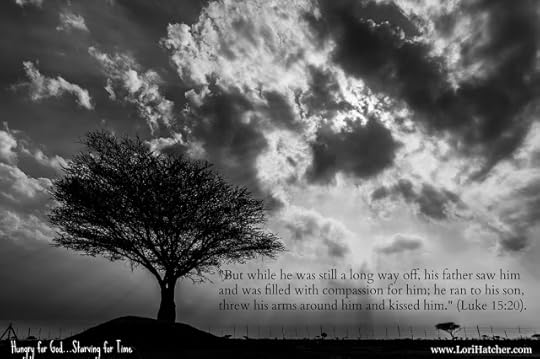
“'Quick! Bring the best robe and put it on him. Put a ring on his finger and sandals on his feet.’”
Certain he had heard wrong, he continue his shame-filled confession, “. . . I am no more worthy to be called your son”
“Bring the fattened calf and kill it. Let's have a feast and celebrate.”
Surely his father wasn’t hearing him. “. . . make me as one of your hired servants.’”
Only the shout of joy and the splash of tears on his outstretched hands stopped his agonized speech.
“For this son of mine was dead and is alive again; he was lost and is found.'”
Strong arms embraced him. Rough hands cradled his face. Brown eyes swimming with grateful tears looked deep into his soul.
And they began to celebrate.
Are you a prodigal? Have the lies of the world, the flesh, and the devil stolen everything good from your life? Please come home. Your Father is waiting to welcome you.
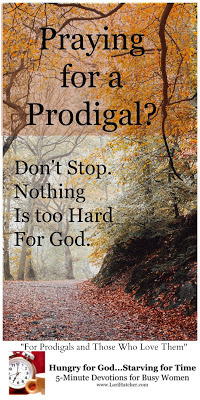 “As long as you did what you felt like doing, ignoring God, you didn’t have to bother with right thinking or right living, or right anything for that matter. But do you call that a free life? What did you get out of it? Nothing you’re proud of now. Where did it get you? A dead end” (Rom. 6:20-21 MSG).
“As long as you did what you felt like doing, ignoring God, you didn’t have to bother with right thinking or right living, or right anything for that matter. But do you call that a free life? What did you get out of it? Nothing you’re proud of now. Where did it get you? A dead end” (Rom. 6:20-21 MSG).
“But now that you’ve found you don’t have to listen to sin tell you what to do, and have discovered the delight of listening to God telling you, what a surprise! A whole, healed, put-together life right now, with more and more of life on the way” (v. 22-23 MSG).
Are you praying for a prodigal? Please don’t stop. Remember, nothing is too hard for God. One day soon, you, too, will have reason to celebrate.
For a beautiful musical rendition of the roller coaster ride of loving a prodigal, here's Keith Green's "Prodigal Son Suite." Listening will be the best 12 minutes you'll spend today. If you're reading by email, CLICK HERE for the live link.
If you enjoyed this post, why not subscribe? I'll send you twice-weekly 5-minute devotions to help nourish your soul.
Because women need to connect with God in the craziness of life.
Enter your email address and VALIDATE the Feedburner email sent to your inbox.
Delivered by FeedBurner
If this post was meaningful to you, would you consider sharing it with a friend by clicking on one of the buttons below? Did you know you can receive bi-weekly Hungry for God posts sent directly to your email inbox? Visit http://www.lori-benotweary.blogspot.com and click on the link in the right hand corner to Subscribe Via Email.
Copyright 2012 by Lori Hatcher
Freedom unlike anything he’d ever experienced. No one ordering him around, telling him when to get up, when to go to work, or when to come home. Money, too, so much more than the pitiful stipend his father had always given him—enough cash to buy nice clothes, wine in abundance, and pleasure. Whoever said, “Money can’t buy happiness,” must not have had any.
And his friends—open-minded, free spirits like himself who had cast off the restraints of their families and discovered the good life. No more narrow-minded authority. No more pious religion making him feel guilty for having fun. No more busybody older folks “praying” for him.
And then there were the women . . . . eager to help him spend his father’s money, they let him buy them a drink. Or two. Or three. They were willing companions for whatever he wanted to do.
Until the money was gone.
“After he had spent everything, there was a severe famine in that whole country, and he began to be in need. So he went and hired himself out to a citizen of that country, who sent him to his fields to feed pigs. He longed to fill his stomach with the pods that the pigs were eating, but no one gave him anything” (Luke 15:14-16).
It wasn’t long before the gnawing ache for the freedom of the open road became a ravenous hunger for the safety of sheltering walls. His delight in worldy-wise friends became disgust at his own debauchery. The craving for exotic delicacies became a yearning for his mother’s simple fare. His eagerness to escape his father’s loving arms became an overpowering desire to seek safety in his embrace.
“When he came to himself . . .”
. . . there are some acts of so-called freedom that destroy freedom. Offer yourselves to sin, for instance, and it’s your last free act. (Rom 6:15-16 MSG).
“. . . he said 'How many of my father's hired men have food to spare, and here I am starving to death!’”
There is food in my father’s house.
The path home was ten times longer than the path that had led him away. Time—too much time—gave him miles of opportunity to rehearse his first words:
“’Father, I have sinned against heaven, and in thy sight.”
You can readily recall, can’t you, how at one time the more you did just what you felt like doing—not caring about others, not caring about God—the worse your life became and the less freedom you had? (Rom. 6:19).
He imagined the multitude of possibilities for his father’s first words, too—everything from a well-deserved lecture to a tirade of justifiable curses. But nothing could have prepared him for the words he heard when he finally knelt, broken and humble, at his father’s feet.

“'Quick! Bring the best robe and put it on him. Put a ring on his finger and sandals on his feet.’”
Certain he had heard wrong, he continue his shame-filled confession, “. . . I am no more worthy to be called your son”
“Bring the fattened calf and kill it. Let's have a feast and celebrate.”
Surely his father wasn’t hearing him. “. . . make me as one of your hired servants.’”
Only the shout of joy and the splash of tears on his outstretched hands stopped his agonized speech.
“For this son of mine was dead and is alive again; he was lost and is found.'”
Strong arms embraced him. Rough hands cradled his face. Brown eyes swimming with grateful tears looked deep into his soul.
And they began to celebrate.
Are you a prodigal? Have the lies of the world, the flesh, and the devil stolen everything good from your life? Please come home. Your Father is waiting to welcome you.
 “As long as you did what you felt like doing, ignoring God, you didn’t have to bother with right thinking or right living, or right anything for that matter. But do you call that a free life? What did you get out of it? Nothing you’re proud of now. Where did it get you? A dead end” (Rom. 6:20-21 MSG).
“As long as you did what you felt like doing, ignoring God, you didn’t have to bother with right thinking or right living, or right anything for that matter. But do you call that a free life? What did you get out of it? Nothing you’re proud of now. Where did it get you? A dead end” (Rom. 6:20-21 MSG). “But now that you’ve found you don’t have to listen to sin tell you what to do, and have discovered the delight of listening to God telling you, what a surprise! A whole, healed, put-together life right now, with more and more of life on the way” (v. 22-23 MSG).
Are you praying for a prodigal? Please don’t stop. Remember, nothing is too hard for God. One day soon, you, too, will have reason to celebrate.
For a beautiful musical rendition of the roller coaster ride of loving a prodigal, here's Keith Green's "Prodigal Son Suite." Listening will be the best 12 minutes you'll spend today. If you're reading by email, CLICK HERE for the live link.
If you enjoyed this post, why not subscribe? I'll send you twice-weekly 5-minute devotions to help nourish your soul.
Because women need to connect with God in the craziness of life.
Enter your email address and VALIDATE the Feedburner email sent to your inbox.
Delivered by FeedBurner
If this post was meaningful to you, would you consider sharing it with a friend by clicking on one of the buttons below? Did you know you can receive bi-weekly Hungry for God posts sent directly to your email inbox? Visit http://www.lori-benotweary.blogspot.com and click on the link in the right hand corner to Subscribe Via Email.
Copyright 2012 by Lori Hatcher
Published on October 26, 2016 18:54
October 23, 2016
It's Not Enough to Do Good Things
He looked befuddled. Standing there at the foot of the escalator with two of the biggest suitcases I’ve ever seen, the young Asian man was stumped. There was no way he was getting those suitcases up the escalator by himself.
 We were in the T.F. Green airport in Cranston, Rhode Island, and I was on my way to the rental car desk. I’m often oblivious to the people around me, but this young man caught my eye, and not just because he was blocking the escalator. I gave him a second glance because he reminded me of the Chinese exchange student who’d been visiting our church.
We were in the T.F. Green airport in Cranston, Rhode Island, and I was on my way to the rental car desk. I’m often oblivious to the people around me, but this young man caught my eye, and not just because he was blocking the escalator. I gave him a second glance because he reminded me of the Chinese exchange student who’d been visiting our church.
“May I help you?” I said, gesturing to his luggage.
“Thank you so much,” he replied.
At the top of the escalator I asked, “Where are you going?”
“To the train station. Do you know where it is?”
I didn’t, but as I scanned the signage, I realized that the rental car desk and the train stop were close to each other.
“We’re headed in the same direction,” I said. “I’d be glad to push one of your suitcases.”
He nodded his thanks. As we walked, he shared with me that he was a freshman student in the United States for the first time to go to school.
“You are very brave,” I said. “I can’t imagine going to a foreign country all by myself.” I told him a few facts about Rhode Island, then noticed we were nearing the rental car counter and train stop. He saw the sign too and reached for the handle of the suitcase I’d been pushing.
“Thank you very much for your help.”
And that’s when the Holy Spirit spoke to me. Say something about me, he urged. If you don’t, he’s going to think you’re just a kind American. I want him to know that you’re kind because you’re a Christian.
“You’re very welcome,” I said. “I’m a Christian, and I’d like to encourage you, if you get the chance, to visit a Christian church. The people will love you there.”
"There is a Christian church in my hometown," he said and nodded goodbye.
We hear a lot about lifestyle evangelism, which originally meant living our lives according to Christian principles and earning the right to share the Gospel with those around us. Lately, though, it’s morphed into living my life according to Christian principles and hoping someone will ask me about my faith. The difference is that often times, people around us don’t connect the dots. We have to do it for them.
 It's not enough to do good things, we must also share the reason why we do them.
It's not enough to do good things, we must also share the reason why we do them.
Every situation is different, and no rule of thumb applies to all scenarios. There are some people in my life, like my coworkers and neighbors, that I have the benefit of a long association. I have time to gradually work God into our conversations, share faith stories, and look for opportunities to show love to them.
There are others, like the young man I met in the airport, that God gives me one chance to sow a spiritual seed, do a kind deed, or speak a kind word to. Whenever I can, I believe I should connect the dots for them by naming the name of Christ.
With a little thought and creativity, it’s not that hard. Or corny. Or awkward.
Here are some ways I’ve used lately:
My Aldi ministry: If you’re familiar with the grocery store Aldi, you know that to use a grocery cart, you have to put a quarter into a slot on the handle and unlock the cart. When you return the cart to the storefront, you get your quarter back. Whenever I have a spare quarter, I look for people to give my grocery cart to so they don’t have to use their own quarter. And, when they return the cart, they get to keep my quarter. When they smile and thank me (and they always do), I tell them, “You’re welcome. God bless you.”
My prayer ministry: I always ask my patients how they’ve been since they were last in the dental office. Sometimes they share troubling health or family issues. Instead of saying, “Oh, I’m so sorry,” I listen sympathetically and tell them I’ll pray for them. If I’m feeling especially brave, I ask, “Would it be OK if I prayed for you right now?” So far, no one has ever refused my offer, and often patients will have tears in their eyes when I say Amen.
These are two simple ideas, and I’m sure you have many more. It’s amazing the opportunities God will send us to speak a word in his name, do a kind deed, or pray a heartfelt prayer if we’ll just open our eyes.
Lord, give us eyes to see the people around us who need you. Help us remember that we are your ambassadors, your hands and feet as you reach out to those who don’t know you. Make us bold as lions and gentle as lambs. Remind us that any good within ourselves is because of you. Use us, Lord, to draw others to yourself. In the precious name of Jesus I pray, Amen.
I’d like to hear your thoughts. Is it enough just to do kind deeds without sharing our reason for doing them? Leave a comment below and share your thoughts. And if you have a creative idea to minister in Jesus’ name, I’d love to hear that, too. If you’re reading by email, CLICK HERE to visit Hungry for God online, scroll to the bottom of the post, and leave a comment there.
A special request from Lori:
If you downloaded a copy of Hungry for God...Starving for Time during my publisher's recent giveaway, or if you've read my book in the past, would you be willing to post a review on Amazon? Reviews are gold to authors and publishers. Your honest opinion would be a blessing to me and a help to other readers searching for good books. My goal is to reach 100 reviews by November--only 21 to go! Click here for the link.
If you enjoyed this post, why not subscribe? I'll send you twice-weekly 5-minute devotions to help nourish your soul.
Because women need to connect with God in the craziness of life.
Enter your email address and VALIDATE the Feedburner email sent to your inbox.
Delivered by FeedBurner
If this post was meaningful to you, would you consider sharing it with a friend by clicking on one of the buttons below? Did you know you can receive bi-weekly Hungry for God posts sent directly to your email inbox? Visit http://www.lori-benotweary.blogspot.com and click on the link in the right hand corner to Subscribe Via Email.
Copyright 2012 by Lori Hatcher
 We were in the T.F. Green airport in Cranston, Rhode Island, and I was on my way to the rental car desk. I’m often oblivious to the people around me, but this young man caught my eye, and not just because he was blocking the escalator. I gave him a second glance because he reminded me of the Chinese exchange student who’d been visiting our church.
We were in the T.F. Green airport in Cranston, Rhode Island, and I was on my way to the rental car desk. I’m often oblivious to the people around me, but this young man caught my eye, and not just because he was blocking the escalator. I gave him a second glance because he reminded me of the Chinese exchange student who’d been visiting our church. “May I help you?” I said, gesturing to his luggage.
“Thank you so much,” he replied.
At the top of the escalator I asked, “Where are you going?”
“To the train station. Do you know where it is?”
I didn’t, but as I scanned the signage, I realized that the rental car desk and the train stop were close to each other.
“We’re headed in the same direction,” I said. “I’d be glad to push one of your suitcases.”
He nodded his thanks. As we walked, he shared with me that he was a freshman student in the United States for the first time to go to school.
“You are very brave,” I said. “I can’t imagine going to a foreign country all by myself.” I told him a few facts about Rhode Island, then noticed we were nearing the rental car counter and train stop. He saw the sign too and reached for the handle of the suitcase I’d been pushing.
“Thank you very much for your help.”
And that’s when the Holy Spirit spoke to me. Say something about me, he urged. If you don’t, he’s going to think you’re just a kind American. I want him to know that you’re kind because you’re a Christian.
“You’re very welcome,” I said. “I’m a Christian, and I’d like to encourage you, if you get the chance, to visit a Christian church. The people will love you there.”
"There is a Christian church in my hometown," he said and nodded goodbye.
We hear a lot about lifestyle evangelism, which originally meant living our lives according to Christian principles and earning the right to share the Gospel with those around us. Lately, though, it’s morphed into living my life according to Christian principles and hoping someone will ask me about my faith. The difference is that often times, people around us don’t connect the dots. We have to do it for them.
 It's not enough to do good things, we must also share the reason why we do them.
It's not enough to do good things, we must also share the reason why we do them.Every situation is different, and no rule of thumb applies to all scenarios. There are some people in my life, like my coworkers and neighbors, that I have the benefit of a long association. I have time to gradually work God into our conversations, share faith stories, and look for opportunities to show love to them.
There are others, like the young man I met in the airport, that God gives me one chance to sow a spiritual seed, do a kind deed, or speak a kind word to. Whenever I can, I believe I should connect the dots for them by naming the name of Christ.
With a little thought and creativity, it’s not that hard. Or corny. Or awkward.
Here are some ways I’ve used lately:
My Aldi ministry: If you’re familiar with the grocery store Aldi, you know that to use a grocery cart, you have to put a quarter into a slot on the handle and unlock the cart. When you return the cart to the storefront, you get your quarter back. Whenever I have a spare quarter, I look for people to give my grocery cart to so they don’t have to use their own quarter. And, when they return the cart, they get to keep my quarter. When they smile and thank me (and they always do), I tell them, “You’re welcome. God bless you.”
My prayer ministry: I always ask my patients how they’ve been since they were last in the dental office. Sometimes they share troubling health or family issues. Instead of saying, “Oh, I’m so sorry,” I listen sympathetically and tell them I’ll pray for them. If I’m feeling especially brave, I ask, “Would it be OK if I prayed for you right now?” So far, no one has ever refused my offer, and often patients will have tears in their eyes when I say Amen.
These are two simple ideas, and I’m sure you have many more. It’s amazing the opportunities God will send us to speak a word in his name, do a kind deed, or pray a heartfelt prayer if we’ll just open our eyes.
Lord, give us eyes to see the people around us who need you. Help us remember that we are your ambassadors, your hands and feet as you reach out to those who don’t know you. Make us bold as lions and gentle as lambs. Remind us that any good within ourselves is because of you. Use us, Lord, to draw others to yourself. In the precious name of Jesus I pray, Amen.
I’d like to hear your thoughts. Is it enough just to do kind deeds without sharing our reason for doing them? Leave a comment below and share your thoughts. And if you have a creative idea to minister in Jesus’ name, I’d love to hear that, too. If you’re reading by email, CLICK HERE to visit Hungry for God online, scroll to the bottom of the post, and leave a comment there.
A special request from Lori:
If you downloaded a copy of Hungry for God...Starving for Time during my publisher's recent giveaway, or if you've read my book in the past, would you be willing to post a review on Amazon? Reviews are gold to authors and publishers. Your honest opinion would be a blessing to me and a help to other readers searching for good books. My goal is to reach 100 reviews by November--only 21 to go! Click here for the link.
If you enjoyed this post, why not subscribe? I'll send you twice-weekly 5-minute devotions to help nourish your soul.
Because women need to connect with God in the craziness of life.
Enter your email address and VALIDATE the Feedburner email sent to your inbox.
Delivered by FeedBurner
If this post was meaningful to you, would you consider sharing it with a friend by clicking on one of the buttons below? Did you know you can receive bi-weekly Hungry for God posts sent directly to your email inbox? Visit http://www.lori-benotweary.blogspot.com and click on the link in the right hand corner to Subscribe Via Email.
Copyright 2012 by Lori Hatcher
Published on October 23, 2016 18:39
October 19, 2016
God's Voice or My Thoughts? How to Know the Difference
 When I went to bed that night, I knew who was right—I was.
When I went to bed that night, I knew who was right—I was. When I awakened the next morning, I wasn’t so sure.
The conversation went over the cliff before I even realized it had changed direction. One minute we were brainstorming ways to fix a problem, and the next minute we were exchanging angry words. He stomped off to bed, and I stayed up and stewed.
Horizontal or vertical, I’m confident we were both rehearsing how right we were and how wrong the other was.
Why didn’t she just look up the information when I asked her to? She doesn’t listen, just goes off and does what she wants to do without listening to me.
Why couldn’t he just wait patiently? I was on to something. Just a few more clicks, and I’d have had the information we needed.
I considered sleeping in the guest bedroom, but wasn’t willing to give up my comfy bed to make a point. But you’d better believe I’m staying waaaaay over on my side when I do come to bed.
Eventually fatigue won out, and I crawled into bed, staying far to the right of the imaginary line I’d drawn down the center.
Lord, I prayed silently as I clung to the edge of the mattress, pride is an ugly thing. Please help him realize he was wrong, and make him apologize for his unkind words. I don’t want us to spend tomorrow at odds with each other. Then I finished with a sincere but skeptical request: And if I was at fault in any way, please reveal this to me. Amen.
The next morning, the strangest thing happened. When the alarm sounded on my iPhone, I heard God’s voice. And it didn't sound like Siri.
I’ve always loved the story in 1 Samuel 3, where God awakened the boy Samuel out of a sound sleep by audibly calling his name. But that’s not what happened to me. Instead, God spoke two sentences into my barely-awake consciousness: I’m sorry I was slow to look up the information you asked for. Will you please forgive me?
As the words echoed in my mind, I knew the Lord was speaking.
First, the words were true. While I wasn’t totally at fault in the argument, I did have a part in it.
Second, the words were a direct answer to the prayer I’d prayed before I fell asleep.
Third, the words did not originate with me. When I’d gone to bed the night before, I was still convinced that I was all right, and he was all wrong. Those two sentences had to have come from God.
Fourth, to say those words to my husband, I’d have to humble myself and take the first step toward reconciliation. Since this was the last thing my sinful flesh wanted to do, I was confident it was God’s idea, not mine.
Once I realized I’d heard from God, I knew I had two choices: obey or disobey.
“Anyone, then, who knows the good he ought to do and doesn't do it, sins,” (Jas. 4:17).
I’d like to say I always obey, but I’d be lying. That day, however, I did what the Lord told me to do. As soon as my husband opened his eyes, I said the words God had planted into my brain.
“I’m sorry I was slow to look up the information you asked for. Will you forgive me?”
“I’m sorry I was grumpy with you. I was sleepy and impatient.”
Kiss. Kiss. Hug. Hug. All was well again.
Not all our arguments end so peacefully. Sometimes I hold on to my stubborn, sinful, self-righteousness and refuse to invite God into the strife. I fail to ask God to show me where I was wrong and focus instead on someone else’s sin or my own perceived innocence.
But when I do pray and ask God to glorify himself, even in our arguments, I give him permission to work. Sometimes he speaks to me through his Word, sometimes through wise counsel, and sometimes, if I’m willing to listen, he speaks through the still, small voice of his Holy Spirit.
If you’re in the middle of a conflict with someone, I invite you to pray about it. Watch to see how he answers. Be quick to obey what he tells you to do. You won’t regret it.
What about you? How has the Lord spoken to you during times of conflict? I’d love to hear your story. Leave a comment below, or, if you’re reading by email, click HERE to visit Hungry for God online, scroll down to the end of the post, and leave a comment there.
A special request from Lori:
If you downloaded a copy of Hungry for God...Starving for Time during my publisher's recent giveaway, or if you've read my book in the past, would you be willing to post a review on Amazon? Reviews are gold to authors and publishers. Your honest opinion would be a blessing to me and a help to other readers searching for good books. My goal is to reach 100 reviews by November--only 21 to go! Click here for the link.
If you enjoyed this post, why not subscribe? I'll send you twice-weekly 5-minute devotions to help nourish your soul.
Because women need to connect with God in the craziness of life.
Enter your email address and VALIDATE the Feedburner email sent to your inbox.
Delivered by FeedBurner
If this post was meaningful to you, would you consider sharing it with a friend by clicking on one of the buttons below? Did you know you can receive bi-weekly Hungry for God posts sent directly to your email inbox? Visit http://www.lori-benotweary.blogspot.com and click on the link in the right hand corner to Subscribe Via Email.
Copyright 2012 by Lori Hatcher
Published on October 19, 2016 18:28
October 16, 2016
Just a Bunch of Nuthin'
 “What did you see?” I asked my friend Cathy.
“What did you see?” I asked my friend Cathy. “Just a bunch of nuthin’.”
Cathy is a treasure hunter. Every weekend she combs estate sales for valuable artwork, china, jewelry, and antiques. It’s a good day when she finds a rare piece of furniture buried in the contents of someone’s attic or a perfectly preserved brooch in the jumble of an old jewelry box.
Cathy’s been doing this awhile and has developed a good eye. She can separate the junk from the gems with a quick glance. That’s why it didn’t take her long to scan the items offered at the sale we attended and declare, “Just a bunch of nuthin’.”
One day, a treasure hunter will examine the contents of my estate. He’ll look at the way I invested my time, talents, and treasure with his all-seeing eye and pronounce a judgement. He’ll heap my works into a great big pile and set a match to it.
 “But on the judgment day, fire will reveal what kind of work each builder has done. The fire will show if a person's work has any value” (1 Cor. 3:13 NLT).
“But on the judgment day, fire will reveal what kind of work each builder has done. The fire will show if a person's work has any value” (1 Cor. 3:13 NLT). “If what he has built survives, he will receive his reward. If it is burned up, he will suffer loss; he himself will be saved, but only as one escaping through the flames (v. 14-15 NIV).
The stuff I’ve done to build my kingdom—poof. Gone like a marshmallow in a campfire.
The stuff I’ve done to build God’s kingdom—refined. Shining like gold in a California stream.
I’ve lived enough of my life to realize that temporary things bring temporary pleasure, but permanent things bring lasting joy. And rewards that will last for eternity. Because I fear losing my reward, dread the shame of squandering what God has entrusted me with, and have a desire to earn treasure in heaven, I must choose carefully how I spend my time, talent, and treasure. I must invest it wisely in things that matter in eternity.
I don’t want to stand before the Lord as he examines my life and hear him declare, “Just a bunch of nuthin’.”
What about you? What changes might the Lord be calling you to make to ensure that you have a hefty pile of enduring treasure to lay at his feet on the judgment day?
I’d love to hear your thoughts. I invite you to leave a comment below, or if you’re reading by email, CLICK HERE to visit Hungry for God online, scroll to the bottom of the post, and leave a comment there.
If you enjoyed this post, why not subscribe? I'll send you twice-weekly 5-minute devotions to help nourish your soul.
Because women need to connect with God in the craziness of life.
Enter your email address and VALIDATE the Feedburner email sent to your inbox.
Delivered by FeedBurner

If this post was meaningful to you, would you consider sharing it with a friend by clicking on one of the buttons below? Did you know you can receive bi-weekly Hungry for God posts sent directly to your email inbox? Visit http://www.lori-benotweary.blogspot.com and click on the link in the right hand corner to Subscribe Via Email.
Copyright 2012 by Lori Hatcher
Published on October 16, 2016 18:00
Refresh Blog
A place to refresh your faith, hope, and prayers with 5-minute weekly posts.
- Lori Hatcher's profile
- 101 followers



